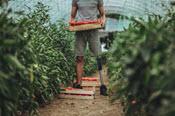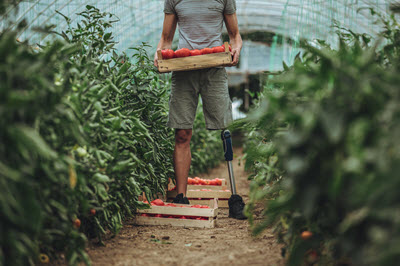
A national charity seeks volunteers and funding to continue supporting injured, ill and disabled farmers
By Kate Ayers
Staff Writer
Better Farming
Through the Canadian Farmers with Disabilities Registry (CFWDR), a registered charity, program coordinators connect recently injured or disabled farmers with other producers who have experienced similar life-changing events.
Grant Smith, a beef farmer from Sorrento, B.C., has benefited from CFWDR support since returning to farming. He has served as the British Columbia CFWDR director for 15 years.
Smith grew up on a small farm and obtained an ag education but worked outside the industry most of his life. After retiring from his job in industrial safety, he had quintuple bypass heart surgery. Afterward, Smith decided to get back into ag, so he and his son started a beef farm.
In the years since his surgery, Smith has had to make some adjustments to his duties on the farm.
“I am less able to have a rigorous work schedule. I need to manage my physical efforts more efficiently,” he says.
“I have to be very careful and mindful of my physical limitations. … I’m forcing myself to slow down and adjust the rate (at which) I am doing things to match my ability to do them better.”
A disabling injury can greatly affect the entire family, causing both financial and mental stress.
“Through conversations I’ve had with farmers who are disabled and have had accidents, (I know) their families are impacted right from the get-go,” Smith says.
Although friends and family want to provide support, they may not have the necessary knowledge or resources to do so. As a result, a disabled farmer may feel isolated and helpless, the CFWDR website says.
Fortunately, the organization’s network provides these producers with guidance by connecting them with other farmers who have recovered.
“I think we need to be upfront about the fact that unfortunate things happen,” Smith says.
“Sometimes people make errors in judgment” and accidents can happen. “We need to work hard at (making) farmers aware of the risks and dangers (their work) involves and (how to) take appropriate steps to mitigate these risks.”

South_agency/E+ photo
Farmers who wish to seek assistance from the CFWDR’s network can join anonymously and connect online or over the phone, the website says.
The group is also building a National Disabled Farmers Entrepreneurship and Leadership Network for interested members, the CFWDR website says.
This program is designed to connect injured, ill or disabled farmers across Canada and create a community of support for participants. Farmers can post questions and receive information from others experiencing similar situations.
The CFWDR provides an essential service for farmers. However, the CFWDR’s viability is threatened by government cutbacks and lack of funding.
As a result, the group is reorganizing and seeks new sources of income. The organization also needs provincial representatives and volunteers to become involved in the registry. People who are interested can contact the CFWDR here.
“We are a source of moral support. … All our members have had accidents or illnesses themselves or in their families. So, they have all been there and know” how to deal with such situations, Smith says.
The CFWDR “provides a valuable resource, and I wish more farmers would avail themselves of it. We are always happy to help in any way that we can.”
Click here if you are interested in supporting the National Disabled Farmers Entrepreneurship and Leadership Network or want to become involved in the registry. BF



Post new comment